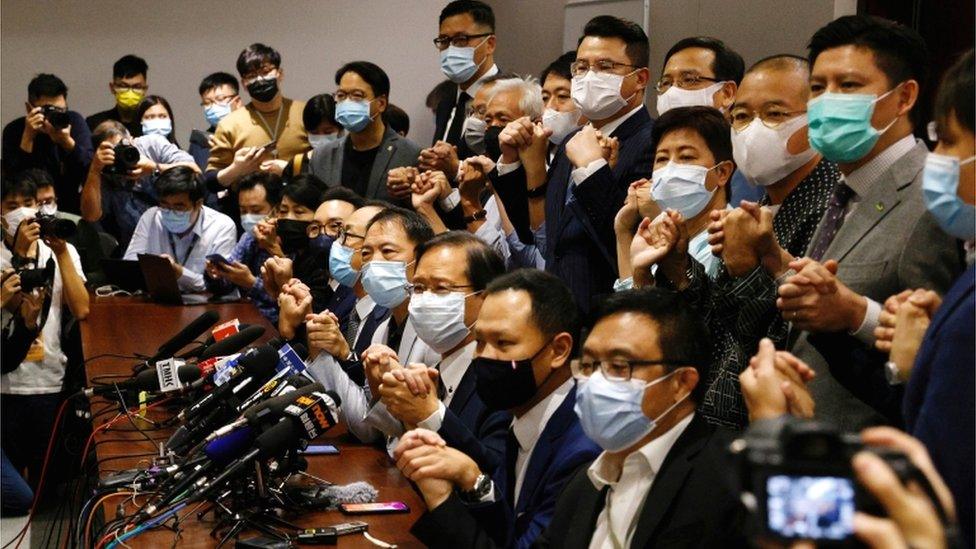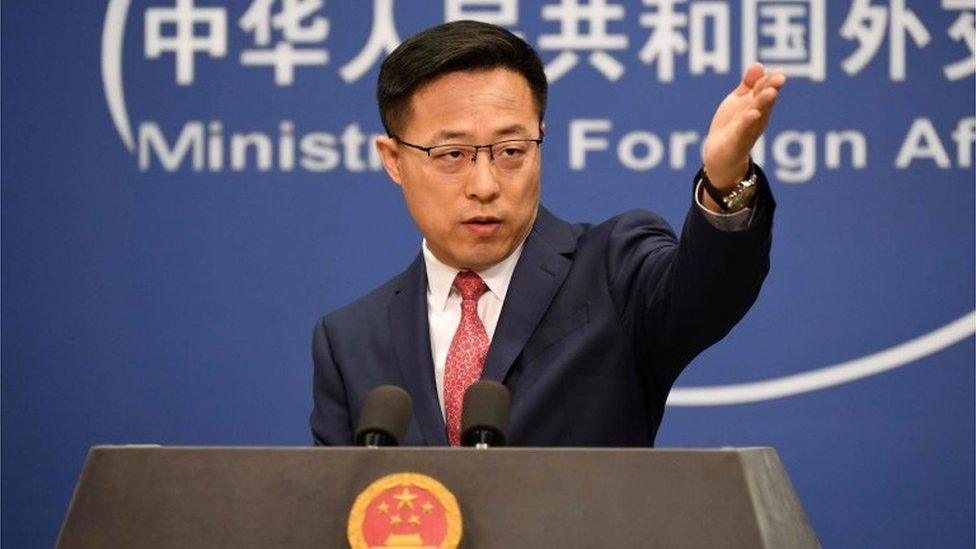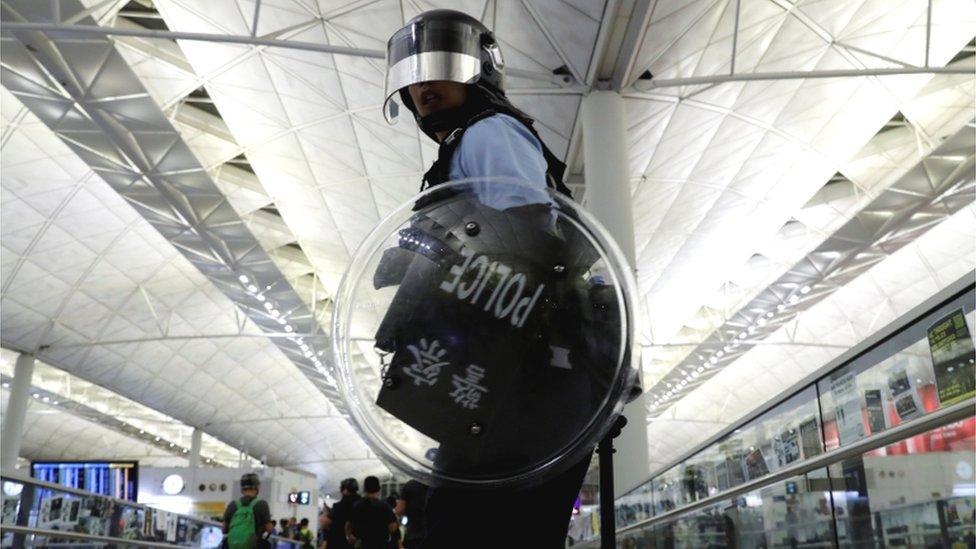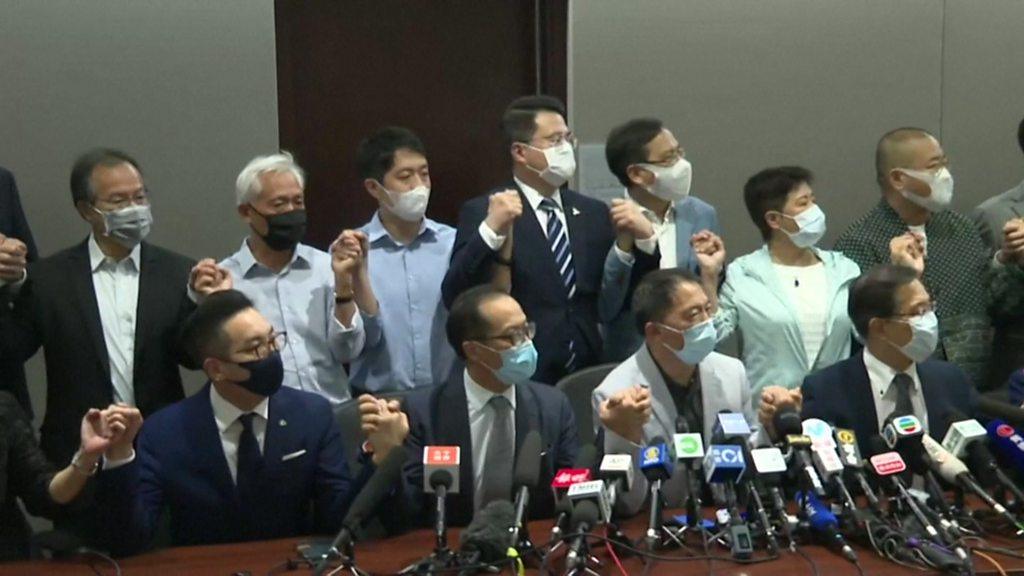Hong Kong: 'Five Eyes could be blinded,' China warns West
- Published

Fifteen pro-democracy lawmakers resigned this month in protest at China's new rules
China has strongly rebuked the UK, the US, Australia, New Zealand and Canada after being accused of a concerted effort to silence critics in Hong Kong.
The countries, which form the Five Eyes alliance, criticised China's imposition of new rules to disqualify elected legislators in Hong Kong.
They urged Beijing to reverse course.
A Chinese foreign ministry spokesman responded that if countries "dared harm China's sovereignty, they should beware that their eyes could be blinded".
"The Chinese never stir trouble , but they aren't afraid of trouble either," Zhao Lijian told journalists in Beijing on Thursday, saying it did not "matter if they had five or 10 eyes".
Last week, Hong Kong expelled four pro-democracy lawmakers from its legislature after Beijing passed a resolution allowing the city's government to dismiss politicians deemed a threat to national security.
In response, all of Hong Kong's pro-democracy lawmakers announced their resignation. For the first time since the UK handed the territory back to China in 1997, the body has almost no dissenting voices.
Claudia Mo: "We have given up the legislative fight at least for the time being."
The dismissal of the four lawmakers was viewed by many as the latest attempt by China to restrict Hong Kong's freedoms, something Beijing denies.
Foreign ministers from the Five Eyes group urged China to reinstate them, saying the move was a clear breach of Beijing's legally binding commitments to protect the territory's freedoms and autonomy.
They also accused Beijing of undermining the rights of people in Hong Kong to elect their representatives.
Five Eyes is an intelligence-sharing alliance of the five Anglophone countries set up during the Cold War and initially developed to monitor the USSR and its allies.
Tension over Hong Kong's national security law
Earlier, China's Ministry of Foreign Affairs in Hong Kong said any attempt by foreign states to threaten or pressure Beijing to make concessions was "doomed to fail".
The history behind Hong Kong's identity crisis and protests - first broadcast November 2019
Hong Kong was returned to China under the "one country, two systems" principle, which allowed it to retain more rights and freedoms than the mainland until 2047.
As a Special Administrative Region, Hong Kong was to have its own legal system, multiple political parties, and rights including freedom of assembly and free speech.
But in late June China passed a controversial, far-reaching national security law in the territory after years of pro-democracy and anti-Beijing protests, which reduced Hong Kong's autonomy and made it easier to punish demonstrators. It criminalises "secession, subversion and collusion with foreign forces".
Beijing says the law will return stability to the territory, but western governments and human rights groups say it effectively curtails freedom of speech and protest. After the law was introduced, a number of pro-democracy groups disbanded out of fears for their safety.
Earlier this month, a reporter who helped investigate suspected police involvement in a violent attack on protesters last year was arrested, in what journalists said was a tactic to discourage reporting.
In response to the security law, the UK offered Hong Kong residents still holding British National Overseas (BNO) status a route to British citizenship.
Around 300,000 people currently hold BNO passports, while an estimated 2.9 million people born before the handover are eligible for one. China last month strongly criticised the UK in response, telling London to "immediately correct its mistakes".

More about China-Hong Kong tensions
- Published13 May 2020

- Published6 November 2020

- Published11 November 2020
